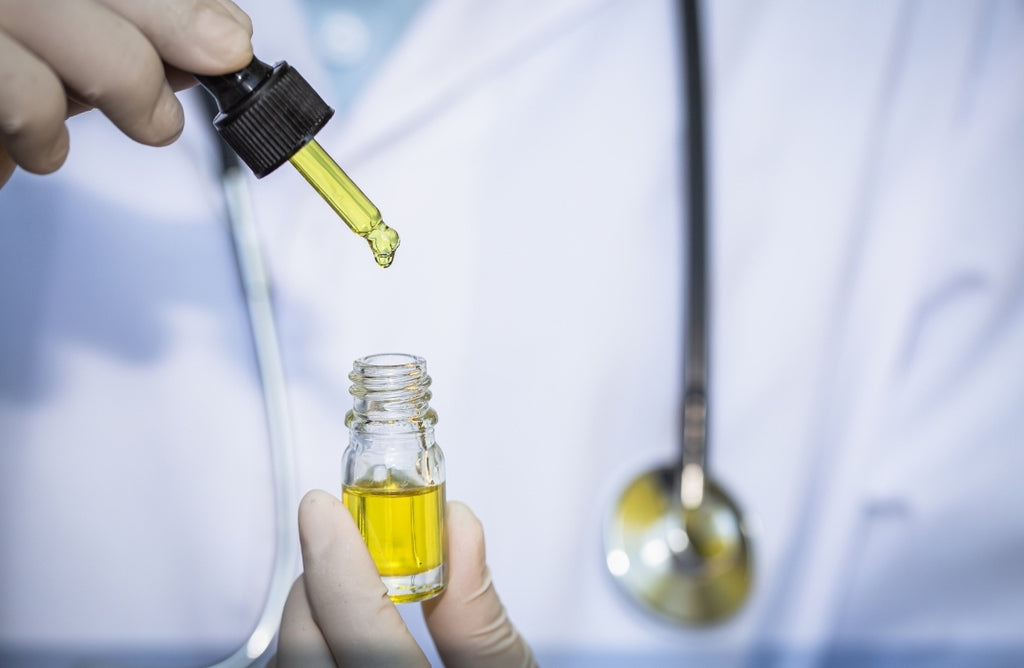Cannabis has become known as one of the oldest medicinal plants in the world. It can also be used as a supportive therapy for multiple sclerosis.
Here you can find out about the different types of therapy with cannabis for MS, how the medicinal plant works and what to look out for when taking it. For example, hemp is processed in different ways. The question of prescription requirements is also clarified.
The most important facts in brief
- Cannabis is used in symptomatic therapy in the case of multiple sclerosis. This is due to the fact that the medicinal plant can have a positive effect on the symptoms of the disease.
- Cannabis cannot be shown to have an influence on the immunological or even inflammatory processes in MS.
- Side effects are also possible. For example, cannabis can cause depression or lead to panic attacks.
What is cannabis?
Cannabis is a medicinal plant that originated in India. It contains a psychoactive ingredient. This is also called tetrahydrocannabinol and has become known by the abbreviation THC. THC is the trigger for the well-known state of intoxication that can be achieved through cannabis.
In Germany, cannabis is also called hashish or marijuana. It is interesting to know that these are two different things:
- Marijuana: The colloquially called "grass" consists of dried leaves, stems and also flowers of the cannabis plant.
- Hashish: Hashish is also often referred to as dope and is made from the resin found in the glandular hairs of the female cannabis.

What is the difference between cannabis and CBD?
THC and CBD are different, even though they are both cannabinoids. There are over 100 different substances and also chemical compounds in hemp itself. These are cannabinoids. The concentrations differ significantly. CBD and THC are particularly well known.
CBD - also known as cannabidiol - is an antagonist of THC. This means that when CBD is taken, there is not the same effect as noticed with THC. The intoxicating effect does not occur. Instead, CBD is even able to break down THC in the body. It can be used to quickly reduce the state of intoxication.
| Cannabis | CBD |
|---|---|
| - Also known as THC | - Referred to as cannabidiol |
| - Binds to CB1 receptors | - Binds to CB1 and CB2 receptors |
| - Strong influence on perception | - Does not induce intoxication |
| - Can cause depression and negative thoughts | - Has a mood-lifting effect and can alleviate the state of intoxication caused by THC |
| - Influence on the ability to concentrate | - Can have a cramp-relieving effect |
| - Recognised as a medicinal product | - Recognised as a food supplement |

Do cannabis flowers help with MS?
Again and again it is pointed out that the use of cannabis flowers in MS can also be a possibility of therapy. They are often mentioned in terms of their effectiveness as a counterpart to the well-known drug "Sativex". This is a medical product composed of CBD and THC.
Cannabis flowers can be combined in different amounts. This makes it possible to adjust them to the patient better than a ready-dosed medicine. In addition, the flowers can contain particularly effective terpenes or also cannabinoids that have already been lost during processing for the medicine.
However, it is not quite so easy to obtain therapy with cannabis flowers. Usually, they are only considered an option when medications with cannabis as the active ingredient have proven to be insufficient.
What is cannabidiol?
As already briefly mentioned, cannabidiol is CBD. CBD has only become known in recent years, although it is one of the most important ingredients found in the hemp plant. In the meantime, however, the effect that CBD has on the human body has been much better researched.
An interesting aspect is that CBD can bind two receptors at the same time. Both CB2 and CB1 react here. For these reasons, CBD cannot provide a state of intoxication, as is the case with THC. Instead, it can have a mood-lifting effect. However, larger amounts have to be taken for this.
CBD has also become known for its pain-reducing effect. It can also inhibit inflammation in the body. Unlike cannabis, CBD has not yet been approved as a medicine.
Background: What you should know about cannabis for MS
Cannabis for MS is mainly used to increase your mobility. At the same time, the therapy is supposed to help you develop a higher pain tolerance. However, this form of treatment is still a therapeutic approach that is not easily accepted. Read on for more background information.
Is cannabis for MS only available on prescription?
Cannabis is listed in the German Narcotics Act. Possession is a punishable offence, as it is an illegal narcotic. A criminal prosecution can be initiated if there is a suspicion that you are in possession of cannabis. So how is therapy for MS supposed to work?
In the area of medical use, the law does not apply. Especially with regard to the use in MS, cannabis has been recognised as a medicine since 2011. In the meantime, different medicines with different dosages are available that can be prescribed. However, there were difficulties with the assumption of costs by the health insurance companies.
A change was only brought into being in 2017. Through a change in the law, cannabis was recognised as a medicine in justified cases. In the meantime, the costs must be covered by the statutory health insurance if you get a prescription from your doctor. So you always need a prescription.

Who is prescribed medical cannabis?
Medical cannabis is primarily prescribed to people who are classified as seriously ill. According to the Ärzteblatt, between 5,000 and 10,000 people in Germany receive medical cannabis. However, this figure applies to both MS patients and patients suffering from cancer.
So far, the therapy has primarily served to alleviate the symptoms and is therefore only prescribed when those affected suffer from severe pain and limitations. Currently, it is not foreseeable to what extent and when this will change.
What dosage of cannabis?
There is no general guidance on the dose of cannabis to be given for MS. Not every patient shows the same reaction when using the medication. Therefore, it is necessary to slowly approach the optimum dosage in direct consultation with the doctor.
It should not be underestimated that cannabis can also have side effects when used as a medicine for MS. For example, the drug can also have an effect on mood and promote the development of depression. Thinking disorders, which develop with regular use, are also possible.
Patients report feeling panic attacks and disorientation after taking it. Persecutory fantasies may also occur. Besides the strong effects on the psyche, cannabis can also have an effect on attention. In some cases, it also has an effect on short-term memory.
Long-term use can also lead to dependence. For this reason, cannabis is only available on prescription. In an individual therapy plan, your doctor will work out the appropriate dosage together with you. In case of severe side effects, you should contact your doctor directly.
Do cannabis globules also work for MS?
The medical effect of globules has not been proven. Cannabis is also available in homeopathic form. For example, it is offered as Cannabis Sativa E Seminibus in different strengths. Studies have not yet been able to prove any influence of globules on MS.
Nevertheless, a trial can certainly be helpful. This form of therapy is seen as a variant with low risks. If you as a patient are possibly not in the situation to receive a prescription for cannabis, the use of globules is a step that can be considered. Especially in mild forms, success is possible.
What to do with MS: Using cannabis for multiple sclerosis
Both THC and CBD are biologically active and have therapeutic properties that are used in medicine. Multiple sclerosis can put a lot of strain on the body, significantly limit life and lead to severe pain. A therapy with cannabis has meanwhile proven to be effective.

What are the advantages of cannabis therapy for MS?
The use of cannabis in MS is increasingly being considered, especially for patients who are experiencing a severe course of the disease and suffer from severe pain. There are several advantages that speak for the use of cannabis:
-
Using cannabis to combat inflammation Multiple sclerosis causes such severe pain because the nerve tissue is characterised by severe inflammation. The autoimmune disease causes the body's own cells to attack the central nervous system. The resulting inflammation places a heavy burden on the body and mind. Neurological symptoms are the result.
Spasms, muscle weakness and the lack of control over movements as well as severe fatigue and also mood swings are not uncommon. Cannabis is said to have an anti-inflammatory effect, which has already been proven several times. The use of cannabis in MS is said to bring about relief from inflammation.
The anti-inflammatory effect has also led to the development of Sativex, the best-known medicine containing cannabis. The cannabis significantly weakens the immune response in the body. This is supposed to alleviate inflammation.
-
Pain-relieving effect on the body The severe pain associated with MS is a significant burden for sufferers. Around 70 % of patients report that the pain particularly affects them. Cannabis is able to have a soothing effect on the pain. There was already a study here in 2005, in which a cannabis-based medicine was used. The effect has already been proven here.
This effect results from the fact that cannabis dampens the immune reaction. Thus, spasms and muscle spasms are reduced and diminished. However, the recommendation here is to rely on THC and not to resort to dronabinol and CBD, which is known as synthetic THC.
-
The influence of cannabis on depression MS patients often develop clinical depression. About 50% of patients are affected. The development in the course of the disease is based, among other things, on the fact that there is severe damage to the nerves that have the task of regulating mood in the body. However, depression can also be a side effect of medication taken to alleviate the symptoms of MS.
The suggestion that cannabis can alleviate depression should be taken with caution. Here it depends on the composition of the drug. A high proportion of THC sometimes has the opposite effect. Recommendations indicate to rely on CBD rather than THC for the treatment of depression.
Although tests indicate that relief from depression can be observed with the use of cannabis, it is not clear to what extent CBD has a positive effect on depression. However, it is not clear to what extent the reduction in depression can be attributed to a reduction in symptoms. Moreover, it can be assumed that not all people are receptive to a positive effect on mood through cannabis.
-
Relaxation for the muscles
A strong symptom of MS is muscle cramps that occur without warning. Around 80% of those affected suffer from this feature. Besides the fact that the cramps start unexpectedly, they also bring severe pain. Besides cramps that resolve quite quickly, muscle spasms are also a symptom.The use of cannabis can reduce the muscle cramps and also the muscle spasms. This result could already be taken from a study that was already carried out in 2005.
It is assumed that this effect is due to the fact that cannabis reduces inflammation in the nerves. This slows down the course of the disease and can increase the quality of life.
-
Relaxation for the intestinal area
By affecting the muscles, MS also affects the reactions in the stomach and intestines. Severe abdominal pain up to incontinence during bowel movements is not uncommon. With the use of cannabis, the intestinal area relaxes. The strong urge to pass stool and not being able to control it diminishes.

Trivia: What else you should know about cannabis in MS
Cannabis has been used in MS for a long time, but it is still a therapy that is only used in severely ill patients. This is also due to the possible side effects.
How long has cannabis been used for MS?
Studies on the effect of cannabis in MS were conducted as early as 2005. However, the first drug for treatment in Germany only came onto the market on 1 July 2011. This was Sativex, which is still used today. The dosage was in the form of a spray. The spray is sprayed into the oral cavity and absorbed through the mucous membranes.
The drug contains cannabidiol and tetrahydrocannabinol. The ingredients are extracted from cannabis sativa.
Are there studies on the use of cannabis in MS?
Over time, various studies have been launched to prove the efficacy of cannabis in MS. For example, in 2018 there was a study conducted by the Institute for Quality and Efficiency in Health Care. The study found that the use of cannabis can support therapy in MS.
But international studies were also conducted. Here, there were investigations of the influence of cannabis on depression or on muscle pain. The results clearly show that the active ingredient can contribute to alleviating the symptoms.
Can cannabis be smoked with MS?
Yes, in principle, the special effect of cannabis in MS can also be achieved if you smoke the product. Here, studies have shown that a large proportion of patients who smoked cannabis felt significantly less pain afterwards.
However, it should be remembered that this is illegal in Germany and is subject to criminal prosecution. For this reason, it is not advisable to obtain cannabis and then smoke it. Consult your doctor about your wish for cannabis therapy.
Conclusion
Cannabis has been used as a medicine to treat the symptoms of multiple sclerosis since 2011. Its influence on severe symptoms of the disease has been shown many times.
However, treatment can only take place if the doctor issues a prescription. Since cannabis can lead to addiction, the benefits and side effects are carefully weighed. Up to now, treatment has primarily been given to patients with a severe course of the disease.
When using cannabis in MS, the dosage plays an important role. Together with the doctor, a differentiated elaboration of the dosage that suits you takes place.

https://www.aerzteblatt.de/nachrichten/72525/Cannabistherapie-bei-Krebs-oder-Multipler-Sklerose
https://www.hanfgoettin.com/unterschied-zwischen-thc-cbd/
https://www.karger.com/Article/Abstract/112901
https://n.neurology.org/content/65/6/812.short
https://www.tandfonline.com/doi/abs/10.1185/030079906x158066
https://journals.sagepub.com/doi/abs/10.1191/1352458504ms1048oa
https://www.dgn.org/neuronews/1711-erstes-cannabis-praeparat-fuer-ms-kranke-erhaeltlich
https://www.leben-mit-ms.de/artikel/2018-04-12/cannabis-als-symptomatische-therapie-bei-ms





